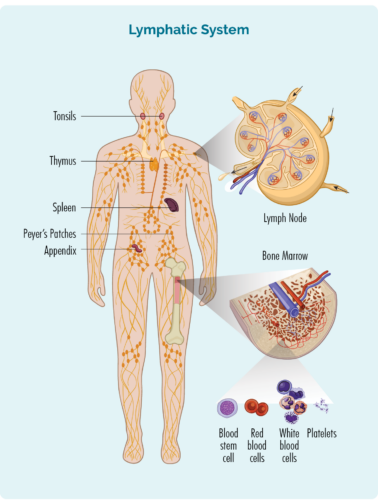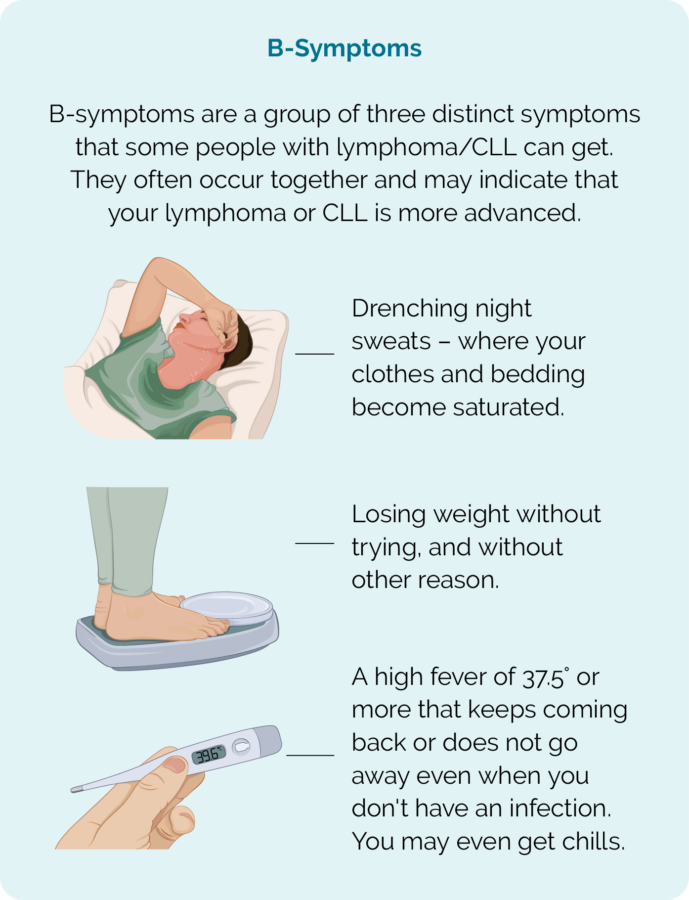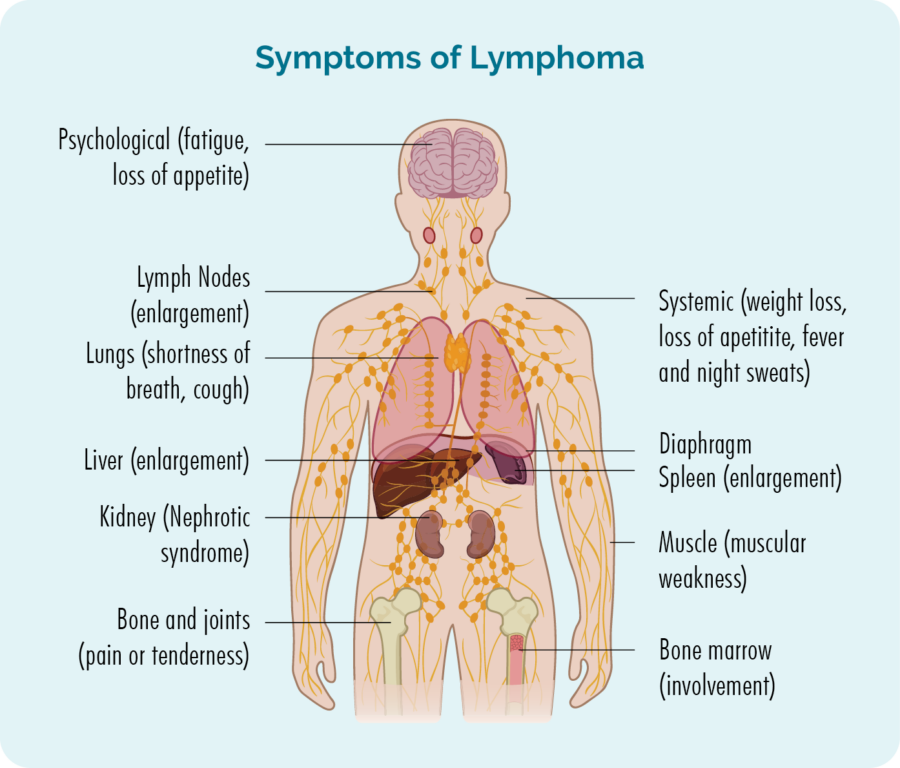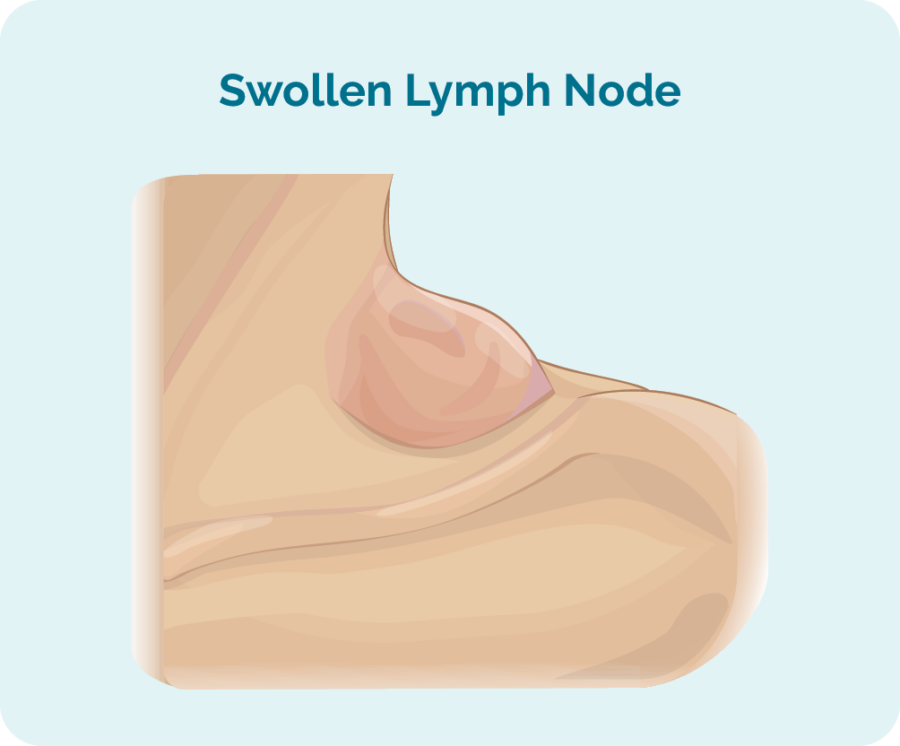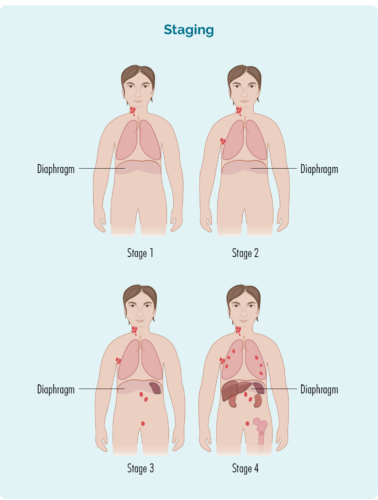What is lymphoma?
To understand Non-Hodgkin Lymphoma, you first need an understanding of what lymphoma is. Lymphoma has been called a blood cancer, cancer of the lymphatic system, and cancer of the immune system. This can be confusing, because it can sound like you have more than one cancer.
To make it simpler we describe lymphoma as The what, The where and The How.
- The what – Lymphoma is a cancer of white blood cells called lymphocytes.
- The where – Lymphocytes usually live in our lymphatic system, so lymphoma usually starts in the lymphocytes in the lymphatic system.
- The how – Lymphocytes and other white blood cells are immune cells that protect us from infection and disease, so when you have lymphoma, your immune system is weakened and you can get more infections.
Please click the link below to see our What is Lymphoma webpage.
What's the difference between Non-Hodgkin and Hodgkin Lymphoma?
Non-Hodgkin Lymphoma is different from Hodgkin Lymphoma because of particular lymphoma cells called a Reed-Sternberg cells that are found in people with Hodgkin Lymphoma, but not in people with Non-Hodgkin Lymphoma.
- All Hodgkin Lymphomas are cancers of B-cell lymphocytes.
- Non-Hodgkin Lymphoma can be cancer of B-cell lymphocytes, T-cell Lymphocytes or Natural Killer T-cells.
What do I need to know about Non-Hodgkin Lymphoma?
Non-Hodgkin Lymphoma is a term used to describe a group of over 75 different subtypes of lymphoma. It can be classed as aggressive or indolent, B-cell or T-cell (including Natural killer T-cell) and may or may not need urgent treatment.
Aggressive and Indolent Non-Hodgkin Lymphoma (NHL)
When you have NHL it is important to know what subtype you have, and whether it is indolent or aggressive. Whether you need treatment, and what type of treatment you will be offered depend on these two things.
Aggressive Non-Hodgkin Lymphoma
Aggressive is a way of saying that your lymphoma is growing and possibly spreading to other parts of your body quickly. Learning you have an aggressive cancer can be very scary, so it’s important to make sure you have as much information as possible to understand your disease, and what to expect.
One thing to remember is that many aggressive NHLs can be cured. In fact, aggressive lymphomas usually respond better to some treatments than indolent lymphomas. Traditional chemotherapy works by destroying fast-growing cells, so the more aggressive (faster-growing) your lymphoma cells are, the more effective chemotherapy may be at destroying them.
Aggressive lymphomas are also often called high-grade lymphoma, meaning they grow quickly and look very different from your normal lymphocytes. With the lymphoma cells growing so quickly, they do not have the chance to develop properly, and so will not be able to work effectively at protecting you from infection and disease.
If you have an aggressive lymphoma, you will need start treatment very soon after you get your diagnosis. However, before treatment starts, you may need more tests and scans to see how much of your body is affected by the lymphoma (what stage of lymphoma you have) and whether there are any genetic markers on your lymphoma cells that will help your doctor work out the best treatment for you.
Examples of aggressive NHL subtypes are listed below.
Indolent Non-Hodgkin Lymphoma
Indolent is another way of saying a slow-growing lymphoma. These lymphomas are often considered chronic illnesses, meaning that you will live with them for the rest of your life. However, many people still live a normal life span with good quality of life with indolent lymphoma.
Indolent lymphomas sometimes don’t grow at all and instead remain dormant – or sleeping. So, while you have the lymphoma in your body, it may not be doing anything to harm you, and as such you may not need any treatment when you are first diagnosed.
Most sleeping lymphomas will not respond to traditional treatments, and research has shown that starting treatment early during this indolent phase does not improve outcomes for patients over those who do not start treatment. However, there are some clinical trials that are looking at different treatment options to see if they may be effective and beneficial during the indolent stage.
About one in five people with an indolent lymphoma will never need any treatment, while others may need treatment at some point. Even while you are not having treatment though, you will be monitored closely by your haematologist or oncologist so they can make sure you are not getting any symptoms that are making you uncomfortable or unwell, and they will make sure the lymphoma is not growing. This time while you don’t have treatment is often called Watch and Wait, or active monitoring.
If your lymphoma wakes up and starts growing, or you start have symptoms, you may need to start treatment. In rare cases, your indolent lymphoma may “transform” into a different more aggressive subtype of lymphoma. For more information on transformed lymphoma click here.
Some of the more common subtypes of indolent NHL are listed below.
Indolent T-cell NHL
Symptoms of Non-Hodgkin Lymphoma
With over 75 subtypes of NHL that can start in any part of your body, symptoms for NHL can differ greatly between people.
Many people with indolent lymphoma may not have any noticeable symptoms, and are only diagnosed after routine tests, or a check for something else. Others may experience symptoms that become worse slowly over time.
With aggressive lymphoma however, symptoms usually start and get worse quickly. Some of the more common symptoms are shown in the images below. For more specific information on symptoms please see your subtype page which can be find on our Types of Lymphoma webpage or see our Symptoms of Lymphoma webpage.
Tests diagnosis and staging
Diagnosis
You will need a biopsy to get a diagnosis of lymphoma and to find out what subtype of lymphoma you have. There are different types of biopsies, and the one you have will depend on the area of your body affected by the lymphoma. Examples of biopsies include:
- Skin biopsy
- Lymph node biopsy
- Bone marrow biopsy (a bone marrow biopsy may be used for diagnosing some types of lymphoma, or to stage others)
Staging
Staging refers to how many areas, and what parts of your body have lymphoma in them.
There are two main staging systems used for NHL. Most NHL use the Ann Arbor or Lugano Staging System while people with CLL may be staged with the RAI staging system.
Treatment for Non-Hodgkin Lymphoma (NHL)
There are many different types of treatment for NHL, and newer treatments are being tested in clinical trials and being approved regularly. The type of treatment you are offered will depend on several things including:
- Your subtype and stage of NHL
- Whether your lymphoma cells have any specific markers or genetic changes on them
- Your age and overall wellbeing
- Whether you have had treatment for lymphoma or other cancers in the past
- Medications you may be taking for other illnesses
- Your personal preferences once you have all the information you need.
Summary
- Non-Hodgkin Lymphoma is a term used to group more than 75 different types of cancers of white blood cells called lymphocytes.
- Know your subtype – If you don’t know what subtype of NHL you have, ask your doctor.
- NHL can be cancers of B-cell lymphoctyes, T-cell lymphocytes of Natural killer T-cells.
- NHL may be aggressive or indolent. Aggressive NHL needs treatment fairly urgently, while many people with indolent lymphoma will not need treatment for some time.
- One in five people with indolent lymphoma may never need treatment.
- Symptoms of NHL will depend on the subtype you have, whether it is indolent or aggressive, and what parts of your body have lymphoma in them.
- There are many different types of treatment for NHL and new ones being approved regularly. The treatment you have will depend on many factors including your subtype, symptoms, age and wellbeing, as well whether you have had treatment for lymphoma before.
- You are not alone, if you would like to chat to one of our Lymphoma Care Nurses click the Contact Us button at the bottom of the screen.
